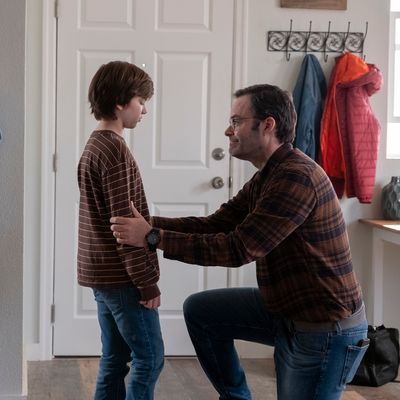
One of the most bone-chilling sequences in the entire run of Barry begins 20 minutes through tonight’s episode: an attack on Barry and Sally’s remote home that leaves the latter calling her husband in a panic, pleading with him to come home. It’s terrifying in a number of ways, starting from the circumstances. John is asleep and vulnerable on the couch, with the door and windows accessible to intruders. When Sally hears faint yelling about coming for her and her son and slowly steps into the living room, we’re primed for action.
And yet I still never could have predicted the actual threats that would show up here and how they would show up. First, a tall man in a black morph suit appears, closely following Sally around the room. That’s a scary image to begin with, almost akin to Rubber Man from the first season of American Horror Story, but it’s the sound editing and Hader’s direction that makes it almost unbearably tense, especially when the camera pans to a spot where the figure isn’t visible. We can only imagine what he’s getting ready to do off-screen.
When Sally makes it back to her bedroom, the man slams and locks the door behind her, only for her to hear a disembodied sound from her own memories: the biker she stabbed back in “Starting Now” repeatedly asking, “What did you put in my eye?” She also hears him apparently inspecting her unconscious son, but she has no time to process it all: Just as she tries to shoot her unloaded gun through the door, the bedroom wall is rammed hard by a pickup truck, tilting the whole house sideways and overturning everything inside. Only a few seconds later, he has driven away.
Lest we think this was all a dream, the episode eventually returns to the living room, with John waking to a wrecked house. But what most interests me about this sequence is that there’s really no in-universe explanation for it. Bill Hader and the other writers tend to plot this show within an inch of its life, but this particular attack has no real plot purpose besides maybe denying Sally the choice of simply waiting for Barry to return. As far as we know, the intruder(s) have nothing to do with any of the main parties we know who want Barry dead, like Hank, Fuches, or Jim Moss.
No, this scene operates more on nightmare logic, like the giggling kids who disappeared into the darkness after knocking on the door in the last episode. It’s not a hallucination, but the logic isn’t necessarily meant to be puzzled over. It’s a stand-in for the threats that could show up at any moment when Barry isn’t there, leaving Sally powerless and ill-prepared. We’ve established that she only feels safe with Barry, and this feels like something she manifested from that belief. It also brings her trauma roaring back, with her mind trapped in that moment eight years ago when she snapped and killed someone.
Bill Hader has found ways to experiment with a wide range of tones on Barry, which feels especially true now. I know not everybody has enjoyed the darker turn that the series has taken, but the opportunity to see Hader hone his style has been worth it, especially with these crosses over into horror. Besides, I still see so much humor here, including Sally plying her kid with vodka to get him out of her hair. And only seconds after leaving a shell-shocked Sally, we’re laughing at Fuches introducing a daughter he just met, inherited from a coffee-shop barista who pledged herself to him as soon as he laid eyes on her.
Really, every scene of the Fuches/NoHo Hank subplot has laugh-out-loud moments. When the two men come together to make a deal — Fuches and his guys protecting Hank’s properties in exchange for money, a beautiful house, and Barry’s head on a platter — it’s a partnership between two people at the top of their criminal game. In the past eight years, Fuches has fully leaned into his “Raven” persona, becoming the notorious, magnetic hit man Hank originally invented (with the help of many tattoos and black nail polish). And Hank has built an empire out of sand, the “crime utopia” he always envisioned. It’s called Nohobal, a cynical reference to the man who had to die for Hank’s dream (Cristobal’s own dream) to come true. There’s even a golden Cristobal statue in the lobby of the enormous offices.
You’d think Hank might want to put Cristobal behind him, but these cheap tributes allow him to pretend he’s honoring the man he loved. After eight years of pouring all his energy into the business, he still doesn’t like being reminded of the truth: He played a huge role in Cristobal’s death, even if he didn’t pull the trigger. What makes that dinner scene great is that Fuches genuinely thinks he’s complimenting Hank by giving him props for killing Cristobal and stealing his idea. From his perspective, Hank’s position is enviable; he can’t understand why it would hurt Hank so much to think of himself as this badass crime lord. Hank originally developed this ruthless side of himself as a defense mechanism, but now he has deluded himself into believing violence is the only way. Facing that fallacy is enough to make him stop the deal and kick everyone out.
Fuches and Hank are always reliably funny, even when they’re at their worst. But the jet-black comedy really comes out in Barry’s story, which follows him back to L.A. to kill Gene. In the opening scene of the episode, Sally acknowledges how ridiculous the idea is; it’s not like killing him would prevent unwanted attention. She’s entirely correct in her suggestion that Barry just wants revenge for Gene turning him in. But it also goes back to that rage Barry felt when Lon O’Neil told him about the story from Gene’s one-person show. He can’t stand the idea that so many people (including his son) will watch this movie and see him as a villain. He wants the agency to tell his own narrative, even though he doesn’t deserve it.
But Sally clearly gets in Barry’s head, especially with her remark about how killing is a sin. So he employs a hilarious, very Barry tactic to overcome that mental hurdle: listening to Christian podcasts to find a justification for killing substantiated by Scripture. Most agree that murder is pretty much a no-no, though there were sanctioned killings in the Old Testament. But the third, narrated by an enforcer turned pastor who killed a hockey player after apparently perceiving a sign from God, insists that murder is “definitely not a sin.” It’s all Barry needs to grab his gun and head for Leo’s house — until he sees Leo’s son. It never would’ve stopped Barry before, but now he has a son of his own, and so for once he can’t do it.
We’ve seen that Gene has his own gift for rationalization; his appearance near the end of “Tricky Legacies” suggests that despite eight years out of the country, Gene was still Gene. But it turns out he got in touch with Warner Bros. not because he actually wanted to consult on the Barry Berkman biopic but to kill the movie and defend Janice’s memory.
It’s hard to know how seriously to take this moralistic streak; Gene’s desire to stop Barry from being immortalized seems genuine, but the story about Gene learning selflessness at a kibbutz in Israel is a bit showy. And as much as he insists that he wants the studios to leave him alone, it says something that they were able to bring him back to the country when not even his own son was. But of course that’s yet another reflection of Gene’s misplaced priorities. Even if he’s sincere in his apology for shooting Leo, and even if he does want to be close to his family again, they don’t come first in his mind. Not even Leo believes him.
At the end of the episode, Barry sees Gene’s open back door and finally moves to finish the job he flew here to do. But it’s a trap: Jim Moss has been waiting outside, presumably knowing Barry would come there after seeing the news. In the final moments, Barry sits across from him in the garage, tied up and finally forced to face the man whose daughter he murdered. With two episodes to go, it’s time for Barry to learn that nobody owes him anything anymore. He relinquished the right to tell this story a long time ago.
Bullet Points
• A display for Cristobal at Nohobal quotes him as saying, “Every day can be like Dave & Buster’s.”
• Each ooh and aah from Fuches’s men seeing their new home made me laugh more than the last.
• “There’s no real reason to rank sins. You can’t say this one’s worse than that one. That’s not really how it works. Unless you’re talking about murder, of course. Murder is by far the worst.”
• Barry easily buys a gun from a department store (another dystopian eight-years-later escalation?), though he’s required to briefly look at some grisly images of gunshot wounds before he can purchase. Not a problem for him! Also, is that the same store we saw last season?
• “The DA would like to see you. Take two bites of that salad and come with me.”


